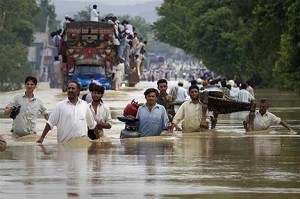
Thatta, 22 December 2011: Policy planning and proper climate change adaptation is need of the hour to mitigate adverse effects of natural climate change factors.
This was said in the day-long Climate Change Conference held today in the coastal city of Thatta.
The SCOPE (Society for Conservation & Protection of Environment) organized the conference in collaboration with Drynet Pakistan, in order to help mobilize a partnership at the national scale for the implementation of a sustainable strategy on impacts of climate change.
The Conference was the first largest meeting of its kind in the coastal belt of Pakistan and it delivered a breakthrough on the response of stakeholders to climate change. The Climate Change Conference closed with the adoption of a number of demands that will strengthen global efforts to fight impacts of climate change.
More than 150 concerned participants highlighted continuous onslaughts of climate change in the form of recent cyclones, floods, heavy rains and flashfloods which have affected millions of people of Sindh Coastal belt region. They called on the Government to pursue ambitious agenda to tackle climate change impacts on country.
The conference was attended by a number of experts from civil society organizations, development professionals, donors/support organizations, Government departments, UN organizations, research institutes and media. Learned speakers of the conference concluded that grave challenges are faced by the vulnerable poor across Pakistan as a result of disasters caused by climate change (mountain areas, deserts, irrigated plains and coastal areas); and that a result based strategy for climate change adaptation and preparedness must be formed and followed.
Tanveer Arif, CEO of SCOPE, presented the Conference Theme paper on “Living with Climate Disaster: Impact of Climate Change Challenges and the Plight of the Poor, and adaptation strategies-with a Special Focus on coastal areas of Pakistan”. He concluded that Climate change is expected to lead to worsening extreme weathers (heavy rain fall and drought conditions) and greater heat extremes, increased threats of drought, floods, air pollution and myriad health problems; and that the adverse effects of natural climate change factors should be mitigated in order to reduce additional stress through climate change adaptation.
Dr. Ghulam Qadir of IUCN presented the impact of Climate Change and gave an account on worldwide impact perspective. He affirmed that climate change is mainly anthropogenic (mad-made) and is one of the most serious threats humanity and our environment have ever faced which if not addressed will cause catastrophic effects to Earth’s ecosystems, biodiversity and infrastructure.
Zulfiqar Halepoto, Senior Advisor of Thardeep Rural Development Programme (TRDP), said: “civil society organizations have great role to play in advocacy and research on climate change impacts and disaster management in order to understand climate change affects and help prepare institutions/communities with the realistic coping mechanisms”. According to him, preventive measures to reduce disaster risk are most effective when they involve participation at all levels, from the local community through the provincial government to the national, regional and international.
Other speakers including Nisar Panhwar of WWF, Prof. Dr. Pervez A. Pathan of SDSC University-Jamshoro, and Mustafa Sarwar Abbasi of Sindh Coastal Authority highlighted gaps in policies and suggested practical approaches to tackle with the climate change menace.
Conference participants also took part in the discussion and the house issued a declaration of actions by the end in which they presented a set of demands from the Government to meet the desired results.
The “Thatto Declaration” demands the Government and all other relevant institutions stakeholders to pave way for adaptation of climate change strategy for the Sindh coastal areas. Environmentalists, human and civil rights activists, and concerned members of the civil society demanded for bold and timely actions from the Government. A few of the key demands are:
- Government should place greater focus on the capacities of the institutions linked to climate change adaptation for mitigating and adapting to the impacts of climate change, and improve integrating their contributions into national and international climate strategies and policies,
- Government should establish adequate legislative, administrative and institutional frameworks at national and/or Provincial level for Climate Change Adaptation, equip these with appropriate competences, and provide adequate funding and staff for the administration of related initiatives and their functions,
- The Government should ensure “Mainstreaming of Disaster Risk Reduction”.
- Role and Response of Stakeholders in the natural disasters should be made public and an accountability mechanism should be ensured.
- In view of flood disaster, effectiveness of DDMA should be enhanced and compulsory training of line departments should be ensured at the district level.
- System for information and communication on health, education and productive & basic infrastructure at the district level should be strengthened.
- Community-based approaches to Disaster Risk Management should be addressed and strengthened.
- Civil society organizations should integrate their programs regarding climate change and strategize collectively.
- Concerned organizations and individuals should form a multi-sector electronic “Network on Climate Change and Disaster” to strengthen debate, bridge communication gape and combine efforts on climate change mitigation and adaptation.


Actually difficult to find advised people about this matter, you sound like you know what you are writing about! With thanks